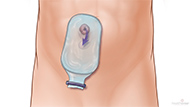Colostomy for Colorectal Cancer
Surgery Overview
After a surgeon has removed the diseased part of your bowel during an operation called a bowel resection, he or she will then sew the two healthy ends of your bowel back together. Sometimes the bowel tissue needs more time to heal before the reattachment, so a temporary colostomy is needed. Sometimes the entire lower colon or rectum is removed because it is diseased. In those cases, the colostomy will be permanent.
To perform a colostomy, the surgeon makes an opening through the skin on your abdomen and connects your bowel to that opening. This opening is called a stoma or, sometimes, a colostomy. Your stool passes out of your body through the opening. A disposable bag is attached over the opening to collect stool.
What To Expect
A colostomy usually requires general anesthesia and a hospital stay of 3 days to 2 weeks. You may have a colostomy immediately after other surgery. You can expect some discomfort during the first few days after surgery. This is usually controllable with home treatment and drugs.
After the colostomy, a plastic bag called a colostomy pouch is taped over the opening on the outside of your body. You will be taught how to take care of your colostomy pouch and how to watch for infection. With proper care, you should be able to return to normal but nonstrenuous activities within a few months.
Why It Is Done
A colostomy is done when part of your colon or rectum has been removed and the part that remains cannot function normally. A colostomy may be done as part of an operation to treat colorectal cancer.
How Well It Works
A colostomy successfully moves your stool out of your body after part of your colon or rectum has been surgically removed and what remains of your colon or rectum cannot do the job.
Risks
The colostomy opening can become infected. To prevent this, keep your skin under the pouch clean and dry.
Current as of: March 28, 2018



